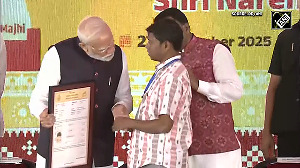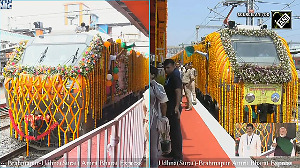When the Indian Airlines flight touched down at Srinagar airport, the temperature outside was 8 degrees Celsius.
I shuddered, thinking about the plight of the earthquake-hit Kashmiris who have been rendered shelter-less.
Sitting next to me on the flight was Deepak Lal, a social worker.
"We worked hard for two days but we could collect only 200 tents (as temporary shelters for the quake-hit) from all over New Delhi," Lal, associate director, Campus Crusade for Christ, said. "Tents are not easy to get."
It is difficult to reach the villages high up in the mountains.
Lal's team of volunteers met with an accident and many of them were now admitted to the Pathankot hospital.
I asked him how workers of Christ could be of help in Uri or Tangdhar.
"The Almighty inspires us," he replied. "Because I am inspired by Christ, I am inspired to share my happiness. We will work in Uri and inspire people."
***
For a journalist, Kashmir is the easiest place to report -- if you have money. Or, if you know the people in power, particularly the army.
Money can buy you anything in the strife-torn Himalayan state.
Mohammad Siddiqui, the taxi driver at the Broadway hotel, was very kind. He offered to charge me only Rs 6,500 per day to visit Uri. CNN or BBC would give him Rs 7,000, he bluntly declared.
For six days, I would need more than Rs 36,000 for a cabbie who wanted to do me a favour by charging me less than CNN, I figured.
When I approached the Regional Transport Office, the rate came down to Rs 5,000 per day -- for travelling less than 400 km in a car without a heater.
Welcome to Kashmir.
***
On arrival, I contacted veteran Congressman and Jammu and Kashmir Deputy Chief Minister Mangat Ram Sharma. In J&K, my surname is often confused with the Kashmiri Bhats. Sharma, a seasoned politician who has won eight elections from Jammu, too thought I was a Kashmiri.
On Sunday afternoon, the deputy chief minister gave me time over tea, sandwich and cakes. In Kashmir everybody is warm and affable, generally.
I asked him if his government had enough tents to provide shelter to the calamity-hit. "We have carried out a survey and found that only three companies make tents in India. Unless we place an order, we just can't get huge quantities," Sharma, who Chief Minister Mufti Mohammed Sayeed never gave much of power, replied.
Kashmir needs more than 30,000 tents. So far, only about 5,000 tents have reached.
****
The bitter Kashmir cold makes you realise how important it is to have a roof over your head. And it also gives you a reality check on India's claims that it is en route to becoming a superpower. And how we now proudly refuse foreign help.
A superpower that can't provide instant relief and shelters for its quake-hit citizens? A superpower that doesn't have a disaster management plan in place?
In J&K, the so-called democratic civil administration failed to help the people. And for the democratically elected government led by Mufti Mohammad Sayeed, it is an uncomfortable fact that it was only the Indian Army that could come to the rescue of the quake-hit.
'The quake has strengthened jihad'
Sharma said the central government had sent the country's best experts to Kashmir.
Mitali Sen, a joint secretary at the home ministry, is coordinating relief operations. Sanjay Mitra from the Prime Minister's Office is also part of the relief operations.
The high level team also has Urban Development Secretary Anil Bijal, Malia Chatterjee of HUDCO, Anand Surf of IIT-Rorkee and many senior officials of the Central Public Works Department.
Local officer Tanveer Jahan is leading the core group helping destitute children and widows.
"We are aware of the seriousness of the need for providing housing for victims," said Sharma.
"We had two options: to let the government rebuild homes or allow people to build homes. We have opted for the latter option. We will give Rs 100,000 per home. We have asked the Jammu and Kashmir Bank to start mobile banks to disperse Rs 40,000 as first instalment. We will open the banks at many places. At all towns we are conducting the workshops to train junior engineers and sensitising them to build earthquake-proof homes," he added.
"We will make the best of use of the central assistance of Rs 630 crores (Rs 6.3 billion)," he claimed.
"First, we have decided to build community homes with toilets which will house 300 people each. These are pre-fabricated halls and will remain even after people shift to their homes. They will be given to the communities to use for social events."
****
During national calamities, the Rashtriya Swaymsevak Sangh is usually first off the blocks in rescue and relief work.
But here, in the Muslim majority state of J&K, there is no trace of the RSS. The Rajiv Gandhi Foundation -- led by Sonia Gandhi -- has taken the lead in relief work.
At Sharma's home I met Harcharna Singh Josh, the Foundation's relief coordinator.
He claimed he had already distributed 50,000 blankets and 800 tents to needy people. There is no shortage of resources, and the rest of India is rushing to the Kashmiris' help, he assured.
***
As of October 14, the earthquake has killed 1,198 people in J&K. Seventeen people died in the Jammu region, and the rest of the casualties were in the Valley. The number of people injured is 6,002 and 37,219 homes have been ravaged.
In Uri, 95 villages -- with a cumulative population of 120,000 -- and in Tangdhar which has a population of 23,000 -- 42 villages have been affected.
***
The Gujarat government, which has expertise in rebuilding earthquake-affected areas, is shy of going public with help to Kashmir, thanks to the complex and sensitive nature of the Himalayan state.
The Gujarat chief secretary has written to the Kashmir government that they can help.
"We are getting people who have worked in rebuilding Kutch," Sharma said.
***
Before leaving for Uri, I asked Sharma about the huge possibilities of corruption in relief work and rehabilitation.
Sharma smiled meaningfully, as only a veteran Congressman with five decades of successful public life can. "Don't worry, the Congress will take power soon and we will make sure nothing goes wrong in rebuilding of Uri and Tangdhar."
Ghulam Nabi Azad, the Congress leader who is supposed to take over from Mufti Sayeed, is touring earthquake-hit areas as if his coronation to the state's top seat has already taken place.
Before kindly guiding me to what I should do in Uri, Sharma says, "I am about to be demoted. I will not remain DCM. I will only be chief of the Congress Legislature Party."
Also see:
Death ruled the beautiful mountains
Uttam's take: Wounded Kashmir
Complete coverage: Tremors across borders





